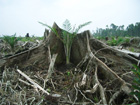 Following a damning report from the Rainforest Action Network (RAN) alleging illegal clearing of rainforest in Indonesia by agriculture-giant Cargill, activists have infiltrated Cargill headquarters in Wayzata, Minnesota and blocked company's activities until the CEO agrees to meet with them. RAN released an investigative report, Cargill's Problems with Palm Oil: A Burning Threat in Borneo, on Cargill's actions in Indonesian Borneo that included some surprising revelations about the number one importer of palm oil in the US.
Following a damning report from the Rainforest Action Network (RAN) alleging illegal clearing of rainforest in Indonesia by agriculture-giant Cargill, activists have infiltrated Cargill headquarters in Wayzata, Minnesota and blocked company's activities until the CEO agrees to meet with them. RAN released an investigative report, Cargill's Problems with Palm Oil: A Burning Threat in Borneo, on Cargill's actions in Indonesian Borneo that included some surprising revelations about the number one importer of palm oil in the US.
In the report, RAN alleges that Cargill is currently holding two undisclosed palm oil plantations in western Kalimantan, which are actively clearing rainforests and destroying peatlands. A member of the Roundtable on Sustainable Palm Oil (RSPO), Cargill said in a public statement that RAN's report was false: "We do not have a set of plantations that are hidden from the public where we are doing things we would not do in public at the plantations we clearly own and operate," said Lori Johnson, a Cargill spokeswoman.
Yet field investigations and interviews by RAN and local NGO, Kontak Masyarakat Borneo (KMB), found that Cargill subsidiary, CTP Holdings, operated two undisclosed palm oil plantations, which it has not revealed publically, to the Indonesian government, or to RSPO. According to RAN both of these plantations lack business permits, location permits, and timber cutting permits.
The larger of the two plantations, estimated at 15,000 hectares, has had 10,500 hectares of rainforest cleared since 2005, an area larger - according to RAN - than all four of the Walt Disney theme parks. The report also states that this palm oil plantation is actively destroying carbon-important peatlands. In addition, locals in the area say that the palm oil plantation has cleared tribal lands without their permission. Since these palm oil plantations don't exist on paper, they are actively spurning both Indonesian law and RSPO requirements.
"Cargill is trying to have their cake and eat it too," said Leila Salazar-Lopez of RAN in a press release. "While Cargill is proclaiming their commitments to RSPO standards, they're going ahead and doing whatever they want to rainforests, waterways and community lands."
This isn't the first time Cargill has been under fire for its palm oil policies. As well as operating its own plantations, Cargill currently sources palm oil from known environmental offenders like Indonesian-company Sinar Mas, which has recently been dropped by both Unilever and Nestle due to continuing environmental concerns. A Greenpeace campaign is currently targeting Nestle, because it is unwilling to cut ties with Cargill and thereby indirectly sources Sinar Mas palm oil.


